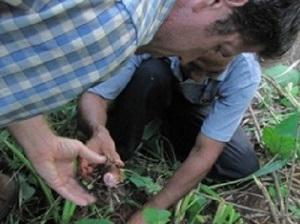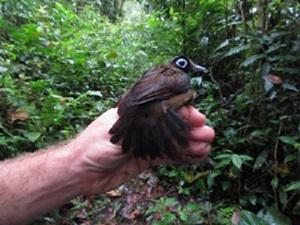Matt Bare
The aim of the project is for the Academy to teach local students the fundamentals of biology and investigative research, in addition to training local landowners in ecological restoration techniques.

Matt Bare and Omar Tello harvesting taro root from the garden.
Ecuador, stretching from the Pacific Ocean across the Andes mountains and into the Amazon basin, is one of the most biodiverse countries of the world, and hosts an estimated 10% of the world’s biodiversity in an area no larger than Italy. However, Ecuador suffers from one of the highest rates of deforestation, and the Amazon region is particularly hard hit. Fragile soil and high precipitation lead to degraded pasture lands, all which can be found easily throughout the region.

Hairy Crested Antbird captured in mist net during avian survey.
On a small plot of former grazing land, a visionary local man started a modest restoration project which would one day become his life’s work, the Orchid and Botanical Garden of Puyo, Ecuador. Began in 1980, the garden has grown from pasture into a showcase of local plants, plus an incredible diversity of birds and invertebrates. Started as a family project, the garden now works with volunteers and local students, houses a small interpretative centre and classroom, and has developed species inventories and long-term research projects.
This pilot project will capitalize on the work of the botanical garden to implement an integrated education centre for the local community in this area of the Ecuadorian Amazon. The pilot project will:
1) recruit and train university students to study biological sciences and conduct research projects and
2) direct training sessions in ecological restoration with local landowners and community members.
Biology education is crucial in the region for several reasons, the first being to improve the local population of research scientists, in order to better manage Ecuador’s remarkable biodiversity. The centre will improve the students’ foundation in the natural sciences, as well as offer a field-based setting to practice techniques and research methodologies. The education centre will also train landowners and community members in ecological restoration, using our thirty years of local experience.
The centre will train landowners in techniques to restore their degraded pasture lands, creating long term benefits of soil retention, watershed protection, and enhancement of bird habitat. Finally, the education centre will be open to schools and visitors of all levels, not just specialists, allowing us to reach a greater section of the general public and teach messages of biodiversity and conservation. In a developing country with rural poverty levels such as Ecuador, local support for forest protection is vital for lasting success.